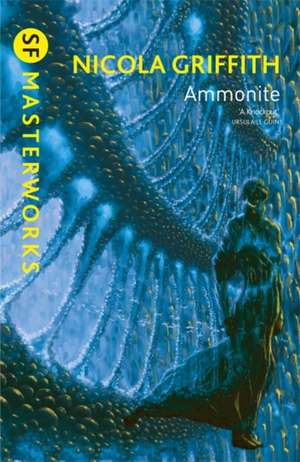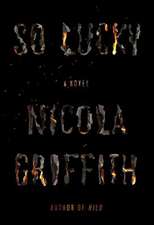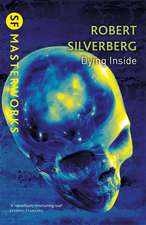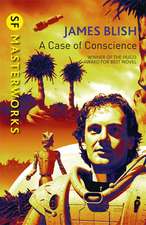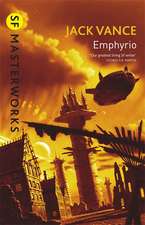Ammonite: S.F. Masterworks
Autor Nicola Griffithen Limba Engleză Paperback – 13 sep 2012
'A marvellous blend of high adventure and mind-boggling social speculation' Kim Stanley Robinson
'A powerful story of connection, allegiance, and obligation' Vonda N. McIntyre
Nicola Griffith (1960-)
Nicola Griffith was born in Yorkshire and currently lives in Seattle. An alumnus of the Michigan State University Clarion science fiction writing workshop, she has won the Nebula, James Tiptree, Jr and World Fantasy Awards.
| Toate formatele și edițiile | Preț | Express |
|---|---|---|
| Paperback (2) | 55.04 lei 3-5 săpt. | +29.65 lei 5-11 zile |
| Orion Publishing Group – 13 sep 2012 | 55.04 lei 3-5 săpt. | +29.65 lei 5-11 zile |
| Del Rey Books – 31 mar 2002 | 127.89 lei 3-5 săpt. |
Din seria S.F. Masterworks
- 23%
 Preț: 53.66 lei
Preț: 53.66 lei - 23%
 Preț: 48.81 lei
Preț: 48.81 lei - 24%
 Preț: 48.13 lei
Preț: 48.13 lei - 22%
 Preț: 65.60 lei
Preț: 65.60 lei - 24%
 Preț: 43.34 lei
Preț: 43.34 lei - 24%
 Preț: 43.59 lei
Preț: 43.59 lei - 23%
 Preț: 49.33 lei
Preț: 49.33 lei - 20%
 Preț: 69.39 lei
Preț: 69.39 lei - 23%
 Preț: 49.19 lei
Preț: 49.19 lei - 24%
 Preț: 48.31 lei
Preț: 48.31 lei - 25%
 Preț: 42.74 lei
Preț: 42.74 lei - 23%
 Preț: 48.94 lei
Preț: 48.94 lei - 25%
 Preț: 42.14 lei
Preț: 42.14 lei - 23%
 Preț: 74.30 lei
Preț: 74.30 lei - 24%
 Preț: 48.57 lei
Preț: 48.57 lei - 24%
 Preț: 47.81 lei
Preț: 47.81 lei -
 Preț: 64.05 lei
Preț: 64.05 lei - 24%
 Preț: 53.14 lei
Preț: 53.14 lei - 23%
 Preț: 48.86 lei
Preț: 48.86 lei - 23%
 Preț: 54.00 lei
Preț: 54.00 lei - 21%
 Preț: 67.73 lei
Preț: 67.73 lei - 23%
 Preț: 54.24 lei
Preț: 54.24 lei - 24%
 Preț: 48.48 lei
Preț: 48.48 lei - 23%
 Preț: 48.81 lei
Preț: 48.81 lei - 24%
 Preț: 47.69 lei
Preț: 47.69 lei - 23%
 Preț: 43.93 lei
Preț: 43.93 lei - 22%
 Preț: 55.16 lei
Preț: 55.16 lei - 24%
 Preț: 47.75 lei
Preț: 47.75 lei - 23%
 Preț: 48.85 lei
Preț: 48.85 lei - 24%
 Preț: 48.07 lei
Preț: 48.07 lei - 22%
 Preț: 49.98 lei
Preț: 49.98 lei - 24%
 Preț: 48.29 lei
Preț: 48.29 lei - 24%
 Preț: 43.49 lei
Preț: 43.49 lei - 23%
 Preț: 48.86 lei
Preț: 48.86 lei - 24%
 Preț: 47.94 lei
Preț: 47.94 lei - 23%
 Preț: 53.78 lei
Preț: 53.78 lei - 23%
 Preț: 53.68 lei
Preț: 53.68 lei - 24%
 Preț: 48.70 lei
Preț: 48.70 lei - 21%
 Preț: 66.43 lei
Preț: 66.43 lei - 24%
 Preț: 52.58 lei
Preț: 52.58 lei - 23%
 Preț: 48.88 lei
Preț: 48.88 lei - 24%
 Preț: 48.25 lei
Preț: 48.25 lei - 24%
 Preț: 47.97 lei
Preț: 47.97 lei - 23%
 Preț: 48.78 lei
Preț: 48.78 lei - 24%
 Preț: 48.07 lei
Preț: 48.07 lei - 25%
 Preț: 42.74 lei
Preț: 42.74 lei - 24%
 Preț: 48.15 lei
Preț: 48.15 lei - 24%
 Preț: 48.45 lei
Preț: 48.45 lei - 24%
 Preț: 47.93 lei
Preț: 47.93 lei - 23%
 Preț: 48.78 lei
Preț: 48.78 lei
Preț: 55.04 lei
Preț vechi: 70.90 lei
-22% Nou
Puncte Express: 83
Preț estimativ în valută:
10.53€ • 10.96$ • 8.70£
10.53€ • 10.96$ • 8.70£
Carte disponibilă
Livrare economică 24 martie-07 aprilie
Livrare express 08-14 martie pentru 39.64 lei
Preluare comenzi: 021 569.72.76
Specificații
ISBN-13: 9780575118232
ISBN-10: 0575118237
Pagini: 416
Dimensiuni: 128 x 194 x 28 mm
Greutate: 0.34 kg
Editura: Orion Publishing Group
Seria S.F. Masterworks
ISBN-10: 0575118237
Pagini: 416
Dimensiuni: 128 x 194 x 28 mm
Greutate: 0.34 kg
Editura: Orion Publishing Group
Seria S.F. Masterworks
Notă biografică
Nicola Griffith is a British science fiction author, editor and essayist. Griffith graduated from the Michigan State University Clarion science fiction writing workshop, in 1988, and has won the NEBULA, the JAMES TIPTREE,JR, the WORLD FANTASY and six LAMBDA LITERARY AWARDS. Although born in Yorkshire, she now lives in Seattle, in the USA.
Descriere
The JAMES TIPTREE JR AWARD-winning novel.
Extras
Marghe’s suit was still open at neck and wrist, and the helmet rested in the crook of her left arm. An ID flash was sealed to her shoulder: “Marguerite Angelica Taishan, SEC.’’ The suit was wrinkled and smelled of just-unrolled plastic, and she felt heavy and awkward, even in the two-thirds gravity of orbital station Estrade.
She stood by the airlock at the inside end of A Section. The door was already open. Waiting. She rested the fingertips of her right hand on the smooth ceramic of the raised hatch frame; it was cool, shocking after two days of the close human heat of A Section.
The sill of the airlock reached her knees; easy enough to step over. No great barrier. The lock chamber itself was two strides across. The far door was still closed, sealed to another sill, like this one. Four steps from here to B Section. Four steps. She had recontracted with SEC, endured six months of retraining on Earth, traveled eighteen months aboard the Terragin, and spent the last two days on the Estrade bumping elbows with the three-member crew, all to take those four steps.
“Well, Nyo and Sigrid say good luck, but they’ll be out there for hours yet, fixing the satellite.’’ Sara Hiam unclipped her headset. The slight, small woman with the atrophied muscles and club-cut dark blond hair was matter-of-fact, using her doctor persona. In the two days since she had come aboard Estrade, Marghe had learned that Hiam had several distinct facets to her personality, facets she rotated to face any given situation. It was a survival tactic, one way Hiam—and Sigrid and Nyo—had managed to spend five years up here without going mad. Marghe knew there was a great deal of the doctor she had not seen; she wondered what the real Sara Hiam was like.
“Life support is up and running in Section D,’’ Hiam said. “Are you ready?
Adrenaline, faster than conscious thought, flooded through Marghe and she had to discipline her breathing, decreasing her pulse and respiration rate, slowing blood flow and reducing the sudden over-oxygenation of her long muscles. Her face pinked as the capillaries under her skin reopened; her muscles stopped fluttering. It was a routine learned long ago.
“I’m ready.
“Very well.’’ Hiam’s voice was suddenly more measured, formal. “I’m obliged to remind you that the vaccine FN-17 now offered is still considered experimental. I also remind you that once you have taken it and once you step beyond this airlock, you will under no circumstances be allowed back into Section A: nor, whether or not you proceed as planned to Grenchstom’s Planet, will you be allowed to enter any other uncontaminated Company installation until you have undergone extensive decontamination procedures.’’ She sounded as though she was reading from a screen prompt. “These procedures consist of—
“I know what they consist of,’’ Marghe said. She pulled on gauntlets, closed her wrist seals. Was it her imagination or did the air coming from the lock smell different?
“This is a taped record, Marghe. Let me finish. These procedures consist of: isolation; the removal of all subject’s blood, marrow, lymph and intestinal flora and fauna and its replacement with normal healthy tissues; reimmunization of subject with all bacterial and viral agents commonly found in Earth-normal human population; prior to return to home planet, further isolation at a location to be decided upon to determine the efficacy of said reimmunization. Do you understand these procedures?
“Yes.’’ The lock was small but, unlike the rest of what she had seen so far of Estrade, blessedly uncluttered.
“Further, I remind you that although FN-17 is a development of the Durallium Company, the Company in no way holds itself responsible for any adverse effects that may result from its use. Nor, though you are to be offered the utmost cooperation aboard Estrade and on Grenchstom’s Planet, are you to be considered an employee of said Company liable to the financial restitution available to indentured personnel. Is this clear?
“Yes.’’ She closed her neck seal, hefted her helmet. “That’s everything?
“Yes.
“Will you help me with this?’’ She should have put the helmet on first; the gauntlets made her clumsy.
When the helmet and shoulder ring clicked together, the suit air hissed on. It tasted hard and flat, not like the warm, rebreathed air of the orbital station. She tongued on the broadcast communications. “Can you hear me?
“I hear you.’’ Hiam checked a workstation screen. “You’re reading well enough.’’ She looked up. “You?
“Loud and clear.’’ Through the audio pickups Hiam sounded even more remote and doctorlike. And then the only sound was Marghe’s own breathing and the faint hiss of the forced air. Blue and purple readouts flickered in the lower left of her vision. Everything worked perfectly. There was nothing else to wait for.
Marghe stepped over the sill. Her boots clumped and echoed in the bare chamber, and her breath sounded loud. She touched the amber light on the control panel; the door slid shut. Hiam, arms folded, was visible through the small observation window.
Marghe studied the variety of lights, then tapped out a command sequence. A display flared red: vacuum. Her helmet pickups were full of a hard hissing, and readouts flickered, then steadied, showing zero pressure, zero oxygen. When she moved, she felt vibration through her boots but heard nothing.
The wall display changed: airlock systems routed to estrade main control prior to decontamination procedures. to proceed, input sequence. Another last-minute reminder: once she started on this, there was no turning back. Marghe tapped out the memorized sequence. raise arms, raise chin, stand with feet apart. Marghe did. blank visor for fifteen seconds. commencing. Even through her darkened visor and closed eyes, she sensed the flare as the chamber was flooded with radiation.
exterior decontamination complete. lock governance returned to interior control.
Marghe cleared her visor, opened her eyes, blinked away the dancing green spots. Hiam was still in the window, watching. Then, suddenly, she was gone.
Marghe watched the blank window for a moment, then took a deep breath and turned to the second door, the second panel with its red light. She reached out to input the sequence that would open it, that would enable her to take that last step over the sill that marked the boundary between what was understood and controlled and what was dangerous.
“Marghe, wait.
Marghe whirled, forgetting the two-thirds gravity. Hiam was back at the observation window, headset at one ear. Marghe had to breathe slowly, in and out, before she could speak. “What?
“Turn on your suit comm.
Marghe tongued the channel on. “What’s wrong? What have—
“Nothing.’’ Over the closed channel, Hiam’s voice was quiet, intimate. No longer the doctor. “This is off the record.
“I don’t—
“Just listen. All those things I said before, about isolation, about spending time somewhere unspecified before going home . . . that’s not what really happens.
Marghe listened to her heart kicking under her ribs. She breathed, seeking calm. Never refuse information, her mother had taught her when she was just six years old, you never know what you might need. But her mother was dead. She managed a Go on gesture.
“If you leave the airlock, if you take the vaccine, you’ll never go home. Not ever. I had a . . . a good friend. On the planet. Was one of the initial batch taken off Jeep for study. She promised to be in touch. I think someone else wrote her mail.
“How could you tell?
“It felt all wrong.
“If she’d been ill—
“No. Just listen. It seemed fine at first. I assumed she just wasn’t feeling good. Decon’s not pleasant. Anyway, I didn’t pay close attention. But once when I wrote back I put in a private joke we’d shared for a long time. A very long time. When I got her response, I knew. It wasn’t her.
Marghe said nothing. She wished she had just taken that last step, not listened to Hiam—this new Hiam. The real one?
Hiam watched Marghe intently, then laughed, a short, hard bark. “You don’t believe me.
“I’m wondering why you didn’t tell me this before. Why you let me get this far.
Hiam stepped right up to the glass, close enough for Marghe to see the pleats of her irises. “Because I couldn’t decide whether to trust you. But, Marghe . . . this is real, and somebody has to know. I can’t prove any of it, but that doesn’t mean it’s not happening. You seemed . . . I just thought . . .’’ She laughed again. “I should have saved my breath.
Marghe did not know what to say. “You and Sigrid and Nyo have all been up here a long time. I know that must—
“Don’t patronize me,’’ Hiam said wearily. “If you don’t want to believe me, then that’s your privilege, but don’t patronize me.
Marghe shook her head. “I’m sorry.
Silence.
To go down to Grenchstom’s Planet—GP, Jeep—would be the culmination of years of study that had started when she was just a child, first with her mother, then her father; had continued at universities, and as assistant SEC rep on Gallipoli, then Beaver. This was the reason she had swallowed her pride and set aside her misgivings about Company, why she had recontracted with SEC after they had betrayed her, why she had traveled vast distances, literally and metaphorically: to come to Jeep and study over a million people who had been out of contact with humanity for two or three hundred years. There would never be another chance like this, never.
“Sara, I have to do this.
Hiam turned away abruptly. “Then you’d better go ahead and do it.
Marghe looked at Hiam’s thin back, hesitated. “I’m sorry,’’ she said again, then tongued off the comm channel and turned slowly to face the flaring red panel. Red for danger.
The known dangers she had prepared for, as far as humanly possible. The vaccine would be waiting for her in D Section. As for the unknown dangers . . . Well, they were unknown. Nothing she could do about them.
She stretched out her hand, clumsy in the gauntlet, and tapped out the sequence slowly and carefully. The red panel blinked off and the lights around the door flared green.
The door slid open.
B Section was silent and dark. Ice glimmered in the dim sodium glow of the emergency floor lights. Marghe stepped over the sill and the door closed behind her. It was done.
The lights ran like runway flares down a narrow corridor between stripped, bare beds, each with its entertainment hookup coiled neatly at the head. Marghe’s boots glowed orange as she walked. Her breathing was loud. She felt utterly alone.
She was the first person who had walked here for five years; five years since the glittering dumbbell shape that was Estrade had been hurriedly converted from an orbital monitoring and communications station to a research and decontamination facility. Five years since the station crew had taken refuge in Section A, leaving Sections D and C for the decontamination of occasional Jeep personnel. B Section, and the long corridor beyond—the shaft of the dumbbell—was the crew’s insurance, their buffer zone, with movement allowed one way only: to the dirty sections.
Marghe watched her boots rise and fall through the orange glow; there was no dust.
The lights at the airlock blinked a reassuring green. The door opened and the wall display told her to blank her visor and hold out her arms; she keyed in the sequence on the next door, stepped through.
The corridor seemed a mile long. The familiar orange running lights gleamed on unsheathed metal and exposed wiring. Gravity decreased rapidly as she approached the center of the shaft; her suit automatically activated the electromagnets in her boots and she had to slide her feet instead of striding.
There was another airlock at the center of the corridor. She went through the dictated procedure, familiar now. The microgravity and her sensitivity to the strong magnetic field under her feet made her dizzy. She closed her eyes and took three fast breaths to trigger a meditative state, monitoring for a moment her heartbeat and electrical activity.
She went on: more corridor, another lock. C Section.
In C Section there were beds, like B Section, but each had a hood waiting to be lowered over an occupant to suck out her blood and lymph, ready to push physical and electrical fingers deep into her intestines to kill and remove the swarm of bacteria and yeasts, eager to sear away the first layers of skin and lave red, raw tissues with colorless fluids until new skin grew back. Tombs for the living. She hated them. They had not been able to save her mother.
She walked faster; she wanted to be out of C Section.
In the lock. Hurry. Eyes shut and arms out. Faster. Key sequence. Now.
Nothing. The panel still flashed red.
Marghe stared at it. If she could not get through into D Section, she was trapped. The lock systems would not permit her to retrace her steps without a record of her having undergone either isolation in D or fluid replacement in C.
Think.
Perhaps she had input the wrong number sequence. She had been in a rush. Yes. Precisely, accurately, she tapped in the code a second time.
No change.
She tongued on the comm channel. “Hiam, can you hear me?
Her helmet speaker clicked. “I can hear. Go ahead.
“I’m still in lock four.
“So my readouts say.
“It won’t accept the sequence.
“You’re sure you got it right?
“Seven-eight-three-six-nine.’’ Silence. “It’s the right one, isn’t it?
“Yes.’’ Another silence. Marghe imagined the tck-tck of Hiam’s nails on the keyboard. “How much air do you have?
“About eighty minutes.
“There should be an emergency suit. In the locker to your left.
Marghe opened the left locker, then the right. They were both empty. “Nothing. And all the emergency blow patches have gone.
“I forgot. We had to clear everything, just in case someone infected tried to blow her way out. Let me think.
Marghe stood in the dim light and breathed precious air. Eighty minutes. She did not want to die here, alone, surrounded by nothing but dead machinery and empty space.
The audio relay clicked back on. “Nyo’s back from her repair stint,’’ Hiam said. “She knows more about the systems than I do, she’s working on it right now. She—hold on.’’ Marghe thought she heard a muttered conference. “Sigrid says Nyo’s on the track of some software glitch.
“How long will it take?
“Hold on.’’ More muted discussion. “No guesses. But Nyo’s working fast.
Minutes dragged by. Marghe concentrated on increasing her blood flow to tensed muscles, washing away fatigue acids and stress toxins. She checked to make sure her boot electros were off. She had seventy-one minutes of air left.
“Marghe, listen, I’ve been talking to Sigrid, and we agree. We’ve decided that if Nyo can’t rewrite in time, then we’ll EVA out from here, open up the exterior hatch of that lock, and bring you back here.
“You’d risk contamination—
“Yes.
Hiam was serious, Marghe realized, in spite of what she believed about Company and the fate of contaminated employees. “Sara, I . . .’’ She floundered. “Thank you.
Hiam laughed, only this time it was not that awful bark, but longer, lighter, more friendly. “Don’t thank me yet.’’ She clicked off, and once again Marghe was surrounded by the sound of her own breath. Her breathing was strong and even: there were people on her side.
Click. “This is Nyo. Try seven-eight-four-six-nine. We’ll monitor.
A four instead of a three. A difference of one digit. Marghe input the sequence: seven, pause, eight, pause, four, pause . . . The door lights flicked from red to green.
“Thank you,’’ she said. “Thank you.
D Section was dark. She had not expected that. She switched over to suit broadcast. “Lights.’’ Brilliant white light sliced on, making her blink.
D was square, only four beds. Two mobile hoods like slick cauls by the far bulkhead. Several workstations. Not dissimilar to crew quarters. Her visor frosted over. She scrubbed at it clumsily, scanned her readouts: external temperature 24 degrees Celsius, air composition and pressure at normal levels, no apparent toxins. Just to make sure, she sat down at the nearest workstation.
“On.’’ The gray screen went black, ready. “Readouts of internal atmospheric composition of this sector.’’ Figures blinked obligingly, agreeing with her own readings. She still felt nervous. “Confirm lock and hull integrity.’’ The screen flashed confirmed. “Off.’’ The screen went back to dead gray.
Awkwardly, she took off her left gauntlet. The right was easier. The slick plastic of her helmet was still cold. She twisted it anticlockwise and cool, clean, untouched-smelling air spilled in under the opened seal. Marghe lifted off the helmet and breathed deep. She was safe, for now.
Marghe pulled hair still damp from the shower free of the collar of her crisp new cliptogether. She commed Hiam.
“I’m ready for the FN-17 now.
“In the food slot.’’ Marghe padded over to the slot. Inside it were two softgels and a glass of water. “Double dose for the first day,’’ Hiam said, “then one tomorrow, one the next day. After that, one every ten days. There’s a possibility of fever the first forty-eight hours, nothing dangerous.
Marghe squeezed the gels gently between finger and thumb and held them up to the light: they were watery pink. The glass of water was the same temperature as her hand. She swallowed both gels at once, then put the empty glass back in the slot.
Marghe heard Hiam sigh. “You think I’d back out at the last minute?
“You never know.
Marghe lay down on the bed farthest from the hoods, face still turned to the screen. “I want some privacy for a little while.
“I’ll have to keep the bio telemetry.
Marghe nodded. “But no visual, no audio. Just for a while.
“Fine.’’ The speaker clicked off.
The click, like that of the comm channel in her helmet, was deliberate, meant to reassure the subject that she was not being monitored. Either could be simulated if the observer deemed it desirable; Marghe chose to believe that this was not one of those times.
It could take up to two minutes for an object to travel down the esophagus to the stomach. She imagined the softgels dropping gently through the pyloric sphincter, the acids in her stomach breaching the gelatin of their shells, the watery pink liquid spilling FN-17. Enzymes breaking it down, carrying it into her bloodstream, into her cells. An experimental biofactured vaccine against Jeep. Jeep the virus, named after the planet.
For more than two years she had tried to imagine how it would feel to swallow the vaccine. She put her hands behind her head, staring at the ceiling.
She stood by the airlock at the inside end of A Section. The door was already open. Waiting. She rested the fingertips of her right hand on the smooth ceramic of the raised hatch frame; it was cool, shocking after two days of the close human heat of A Section.
The sill of the airlock reached her knees; easy enough to step over. No great barrier. The lock chamber itself was two strides across. The far door was still closed, sealed to another sill, like this one. Four steps from here to B Section. Four steps. She had recontracted with SEC, endured six months of retraining on Earth, traveled eighteen months aboard the Terragin, and spent the last two days on the Estrade bumping elbows with the three-member crew, all to take those four steps.
“Well, Nyo and Sigrid say good luck, but they’ll be out there for hours yet, fixing the satellite.’’ Sara Hiam unclipped her headset. The slight, small woman with the atrophied muscles and club-cut dark blond hair was matter-of-fact, using her doctor persona. In the two days since she had come aboard Estrade, Marghe had learned that Hiam had several distinct facets to her personality, facets she rotated to face any given situation. It was a survival tactic, one way Hiam—and Sigrid and Nyo—had managed to spend five years up here without going mad. Marghe knew there was a great deal of the doctor she had not seen; she wondered what the real Sara Hiam was like.
“Life support is up and running in Section D,’’ Hiam said. “Are you ready?
Adrenaline, faster than conscious thought, flooded through Marghe and she had to discipline her breathing, decreasing her pulse and respiration rate, slowing blood flow and reducing the sudden over-oxygenation of her long muscles. Her face pinked as the capillaries under her skin reopened; her muscles stopped fluttering. It was a routine learned long ago.
“I’m ready.
“Very well.’’ Hiam’s voice was suddenly more measured, formal. “I’m obliged to remind you that the vaccine FN-17 now offered is still considered experimental. I also remind you that once you have taken it and once you step beyond this airlock, you will under no circumstances be allowed back into Section A: nor, whether or not you proceed as planned to Grenchstom’s Planet, will you be allowed to enter any other uncontaminated Company installation until you have undergone extensive decontamination procedures.’’ She sounded as though she was reading from a screen prompt. “These procedures consist of—
“I know what they consist of,’’ Marghe said. She pulled on gauntlets, closed her wrist seals. Was it her imagination or did the air coming from the lock smell different?
“This is a taped record, Marghe. Let me finish. These procedures consist of: isolation; the removal of all subject’s blood, marrow, lymph and intestinal flora and fauna and its replacement with normal healthy tissues; reimmunization of subject with all bacterial and viral agents commonly found in Earth-normal human population; prior to return to home planet, further isolation at a location to be decided upon to determine the efficacy of said reimmunization. Do you understand these procedures?
“Yes.’’ The lock was small but, unlike the rest of what she had seen so far of Estrade, blessedly uncluttered.
“Further, I remind you that although FN-17 is a development of the Durallium Company, the Company in no way holds itself responsible for any adverse effects that may result from its use. Nor, though you are to be offered the utmost cooperation aboard Estrade and on Grenchstom’s Planet, are you to be considered an employee of said Company liable to the financial restitution available to indentured personnel. Is this clear?
“Yes.’’ She closed her neck seal, hefted her helmet. “That’s everything?
“Yes.
“Will you help me with this?’’ She should have put the helmet on first; the gauntlets made her clumsy.
When the helmet and shoulder ring clicked together, the suit air hissed on. It tasted hard and flat, not like the warm, rebreathed air of the orbital station. She tongued on the broadcast communications. “Can you hear me?
“I hear you.’’ Hiam checked a workstation screen. “You’re reading well enough.’’ She looked up. “You?
“Loud and clear.’’ Through the audio pickups Hiam sounded even more remote and doctorlike. And then the only sound was Marghe’s own breathing and the faint hiss of the forced air. Blue and purple readouts flickered in the lower left of her vision. Everything worked perfectly. There was nothing else to wait for.
Marghe stepped over the sill. Her boots clumped and echoed in the bare chamber, and her breath sounded loud. She touched the amber light on the control panel; the door slid shut. Hiam, arms folded, was visible through the small observation window.
Marghe studied the variety of lights, then tapped out a command sequence. A display flared red: vacuum. Her helmet pickups were full of a hard hissing, and readouts flickered, then steadied, showing zero pressure, zero oxygen. When she moved, she felt vibration through her boots but heard nothing.
The wall display changed: airlock systems routed to estrade main control prior to decontamination procedures. to proceed, input sequence. Another last-minute reminder: once she started on this, there was no turning back. Marghe tapped out the memorized sequence. raise arms, raise chin, stand with feet apart. Marghe did. blank visor for fifteen seconds. commencing. Even through her darkened visor and closed eyes, she sensed the flare as the chamber was flooded with radiation.
exterior decontamination complete. lock governance returned to interior control.
Marghe cleared her visor, opened her eyes, blinked away the dancing green spots. Hiam was still in the window, watching. Then, suddenly, she was gone.
Marghe watched the blank window for a moment, then took a deep breath and turned to the second door, the second panel with its red light. She reached out to input the sequence that would open it, that would enable her to take that last step over the sill that marked the boundary between what was understood and controlled and what was dangerous.
“Marghe, wait.
Marghe whirled, forgetting the two-thirds gravity. Hiam was back at the observation window, headset at one ear. Marghe had to breathe slowly, in and out, before she could speak. “What?
“Turn on your suit comm.
Marghe tongued the channel on. “What’s wrong? What have—
“Nothing.’’ Over the closed channel, Hiam’s voice was quiet, intimate. No longer the doctor. “This is off the record.
“I don’t—
“Just listen. All those things I said before, about isolation, about spending time somewhere unspecified before going home . . . that’s not what really happens.
Marghe listened to her heart kicking under her ribs. She breathed, seeking calm. Never refuse information, her mother had taught her when she was just six years old, you never know what you might need. But her mother was dead. She managed a Go on gesture.
“If you leave the airlock, if you take the vaccine, you’ll never go home. Not ever. I had a . . . a good friend. On the planet. Was one of the initial batch taken off Jeep for study. She promised to be in touch. I think someone else wrote her mail.
“How could you tell?
“It felt all wrong.
“If she’d been ill—
“No. Just listen. It seemed fine at first. I assumed she just wasn’t feeling good. Decon’s not pleasant. Anyway, I didn’t pay close attention. But once when I wrote back I put in a private joke we’d shared for a long time. A very long time. When I got her response, I knew. It wasn’t her.
Marghe said nothing. She wished she had just taken that last step, not listened to Hiam—this new Hiam. The real one?
Hiam watched Marghe intently, then laughed, a short, hard bark. “You don’t believe me.
“I’m wondering why you didn’t tell me this before. Why you let me get this far.
Hiam stepped right up to the glass, close enough for Marghe to see the pleats of her irises. “Because I couldn’t decide whether to trust you. But, Marghe . . . this is real, and somebody has to know. I can’t prove any of it, but that doesn’t mean it’s not happening. You seemed . . . I just thought . . .’’ She laughed again. “I should have saved my breath.
Marghe did not know what to say. “You and Sigrid and Nyo have all been up here a long time. I know that must—
“Don’t patronize me,’’ Hiam said wearily. “If you don’t want to believe me, then that’s your privilege, but don’t patronize me.
Marghe shook her head. “I’m sorry.
Silence.
To go down to Grenchstom’s Planet—GP, Jeep—would be the culmination of years of study that had started when she was just a child, first with her mother, then her father; had continued at universities, and as assistant SEC rep on Gallipoli, then Beaver. This was the reason she had swallowed her pride and set aside her misgivings about Company, why she had recontracted with SEC after they had betrayed her, why she had traveled vast distances, literally and metaphorically: to come to Jeep and study over a million people who had been out of contact with humanity for two or three hundred years. There would never be another chance like this, never.
“Sara, I have to do this.
Hiam turned away abruptly. “Then you’d better go ahead and do it.
Marghe looked at Hiam’s thin back, hesitated. “I’m sorry,’’ she said again, then tongued off the comm channel and turned slowly to face the flaring red panel. Red for danger.
The known dangers she had prepared for, as far as humanly possible. The vaccine would be waiting for her in D Section. As for the unknown dangers . . . Well, they were unknown. Nothing she could do about them.
She stretched out her hand, clumsy in the gauntlet, and tapped out the sequence slowly and carefully. The red panel blinked off and the lights around the door flared green.
The door slid open.
B Section was silent and dark. Ice glimmered in the dim sodium glow of the emergency floor lights. Marghe stepped over the sill and the door closed behind her. It was done.
The lights ran like runway flares down a narrow corridor between stripped, bare beds, each with its entertainment hookup coiled neatly at the head. Marghe’s boots glowed orange as she walked. Her breathing was loud. She felt utterly alone.
She was the first person who had walked here for five years; five years since the glittering dumbbell shape that was Estrade had been hurriedly converted from an orbital monitoring and communications station to a research and decontamination facility. Five years since the station crew had taken refuge in Section A, leaving Sections D and C for the decontamination of occasional Jeep personnel. B Section, and the long corridor beyond—the shaft of the dumbbell—was the crew’s insurance, their buffer zone, with movement allowed one way only: to the dirty sections.
Marghe watched her boots rise and fall through the orange glow; there was no dust.
The lights at the airlock blinked a reassuring green. The door opened and the wall display told her to blank her visor and hold out her arms; she keyed in the sequence on the next door, stepped through.
The corridor seemed a mile long. The familiar orange running lights gleamed on unsheathed metal and exposed wiring. Gravity decreased rapidly as she approached the center of the shaft; her suit automatically activated the electromagnets in her boots and she had to slide her feet instead of striding.
There was another airlock at the center of the corridor. She went through the dictated procedure, familiar now. The microgravity and her sensitivity to the strong magnetic field under her feet made her dizzy. She closed her eyes and took three fast breaths to trigger a meditative state, monitoring for a moment her heartbeat and electrical activity.
She went on: more corridor, another lock. C Section.
In C Section there were beds, like B Section, but each had a hood waiting to be lowered over an occupant to suck out her blood and lymph, ready to push physical and electrical fingers deep into her intestines to kill and remove the swarm of bacteria and yeasts, eager to sear away the first layers of skin and lave red, raw tissues with colorless fluids until new skin grew back. Tombs for the living. She hated them. They had not been able to save her mother.
She walked faster; she wanted to be out of C Section.
In the lock. Hurry. Eyes shut and arms out. Faster. Key sequence. Now.
Nothing. The panel still flashed red.
Marghe stared at it. If she could not get through into D Section, she was trapped. The lock systems would not permit her to retrace her steps without a record of her having undergone either isolation in D or fluid replacement in C.
Think.
Perhaps she had input the wrong number sequence. She had been in a rush. Yes. Precisely, accurately, she tapped in the code a second time.
No change.
She tongued on the comm channel. “Hiam, can you hear me?
Her helmet speaker clicked. “I can hear. Go ahead.
“I’m still in lock four.
“So my readouts say.
“It won’t accept the sequence.
“You’re sure you got it right?
“Seven-eight-three-six-nine.’’ Silence. “It’s the right one, isn’t it?
“Yes.’’ Another silence. Marghe imagined the tck-tck of Hiam’s nails on the keyboard. “How much air do you have?
“About eighty minutes.
“There should be an emergency suit. In the locker to your left.
Marghe opened the left locker, then the right. They were both empty. “Nothing. And all the emergency blow patches have gone.
“I forgot. We had to clear everything, just in case someone infected tried to blow her way out. Let me think.
Marghe stood in the dim light and breathed precious air. Eighty minutes. She did not want to die here, alone, surrounded by nothing but dead machinery and empty space.
The audio relay clicked back on. “Nyo’s back from her repair stint,’’ Hiam said. “She knows more about the systems than I do, she’s working on it right now. She—hold on.’’ Marghe thought she heard a muttered conference. “Sigrid says Nyo’s on the track of some software glitch.
“How long will it take?
“Hold on.’’ More muted discussion. “No guesses. But Nyo’s working fast.
Minutes dragged by. Marghe concentrated on increasing her blood flow to tensed muscles, washing away fatigue acids and stress toxins. She checked to make sure her boot electros were off. She had seventy-one minutes of air left.
“Marghe, listen, I’ve been talking to Sigrid, and we agree. We’ve decided that if Nyo can’t rewrite in time, then we’ll EVA out from here, open up the exterior hatch of that lock, and bring you back here.
“You’d risk contamination—
“Yes.
Hiam was serious, Marghe realized, in spite of what she believed about Company and the fate of contaminated employees. “Sara, I . . .’’ She floundered. “Thank you.
Hiam laughed, only this time it was not that awful bark, but longer, lighter, more friendly. “Don’t thank me yet.’’ She clicked off, and once again Marghe was surrounded by the sound of her own breath. Her breathing was strong and even: there were people on her side.
Click. “This is Nyo. Try seven-eight-four-six-nine. We’ll monitor.
A four instead of a three. A difference of one digit. Marghe input the sequence: seven, pause, eight, pause, four, pause . . . The door lights flicked from red to green.
“Thank you,’’ she said. “Thank you.
D Section was dark. She had not expected that. She switched over to suit broadcast. “Lights.’’ Brilliant white light sliced on, making her blink.
D was square, only four beds. Two mobile hoods like slick cauls by the far bulkhead. Several workstations. Not dissimilar to crew quarters. Her visor frosted over. She scrubbed at it clumsily, scanned her readouts: external temperature 24 degrees Celsius, air composition and pressure at normal levels, no apparent toxins. Just to make sure, she sat down at the nearest workstation.
“On.’’ The gray screen went black, ready. “Readouts of internal atmospheric composition of this sector.’’ Figures blinked obligingly, agreeing with her own readings. She still felt nervous. “Confirm lock and hull integrity.’’ The screen flashed confirmed. “Off.’’ The screen went back to dead gray.
Awkwardly, she took off her left gauntlet. The right was easier. The slick plastic of her helmet was still cold. She twisted it anticlockwise and cool, clean, untouched-smelling air spilled in under the opened seal. Marghe lifted off the helmet and breathed deep. She was safe, for now.
Marghe pulled hair still damp from the shower free of the collar of her crisp new cliptogether. She commed Hiam.
“I’m ready for the FN-17 now.
“In the food slot.’’ Marghe padded over to the slot. Inside it were two softgels and a glass of water. “Double dose for the first day,’’ Hiam said, “then one tomorrow, one the next day. After that, one every ten days. There’s a possibility of fever the first forty-eight hours, nothing dangerous.
Marghe squeezed the gels gently between finger and thumb and held them up to the light: they were watery pink. The glass of water was the same temperature as her hand. She swallowed both gels at once, then put the empty glass back in the slot.
Marghe heard Hiam sigh. “You think I’d back out at the last minute?
“You never know.
Marghe lay down on the bed farthest from the hoods, face still turned to the screen. “I want some privacy for a little while.
“I’ll have to keep the bio telemetry.
Marghe nodded. “But no visual, no audio. Just for a while.
“Fine.’’ The speaker clicked off.
The click, like that of the comm channel in her helmet, was deliberate, meant to reassure the subject that she was not being monitored. Either could be simulated if the observer deemed it desirable; Marghe chose to believe that this was not one of those times.
It could take up to two minutes for an object to travel down the esophagus to the stomach. She imagined the softgels dropping gently through the pyloric sphincter, the acids in her stomach breaching the gelatin of their shells, the watery pink liquid spilling FN-17. Enzymes breaking it down, carrying it into her bloodstream, into her cells. An experimental biofactured vaccine against Jeep. Jeep the virus, named after the planet.
For more than two years she had tried to imagine how it would feel to swallow the vaccine. She put her hands behind her head, staring at the ceiling.
Recenzii
“A knockout . . . Strong, likeable characters, a compelling story, and a very interesting take on gender.”
–URSULA K. LE GUIN
“A POWERFUL STORY OF CONNECTION, ALLEGIANCE, AND OBLIGATION. Read Nicola Griffith’s book–and keep an eye out for her name in the future.”
–VONDA N. MCINTYRE
–URSULA K. LE GUIN
“A POWERFUL STORY OF CONNECTION, ALLEGIANCE, AND OBLIGATION. Read Nicola Griffith’s book–and keep an eye out for her name in the future.”
–VONDA N. MCINTYRE
